(Reading Time: 18 min Approx)
When Food Becomes Jewellery
“I really have to get ready for tomorrow ASAP!!” thought Rishabh, packing his bags, packing his ‘bare necessities’. It was his ‘problem free philosophy’, and ‘Hakuna Matata’! He was all done. Mom came inside, with a rolling pin in her hand.
– “Where have you put your dirty clothes Rishu? Again, in the cupboard?”
– “Come on now ma! Leave my clothes alone! They are scared of you! You beat them mercilessly.”
– “You youngsters nowadays! Not even thinking how your parents are taking care of everything. Let your father come today ….”
Mom goes out of the room murmuring, while Rishabh stares at his cupboard lovingly,
– “Yes, I will protect you from the merciless beating of the red queen my dear ones….” said Rishabh in his mind.
Rishabh was all set to go out again this summer vacation. His mother and father are really busy service people. His father was always on duty for his countrymen and his mother for her family. So, Rishabh had to go to his grandmother alone. Though this alone thing is not new for him as his father planned a yearly solo trip for him, so that he can see his country through his own eyes, and make his own decisions.
 This year he is going to his grandmother’s house, situated in interior West Bengal. It has been a long time since he saw her, and she insisted Rishabh to come to the village.
This year he is going to his grandmother’s house, situated in interior West Bengal. It has been a long time since he saw her, and she insisted Rishabh to come to the village.
Rishabh was so excited to go to her, as according to him, she was the best cook in the world. And we can call Rishabh a foodie traveler. In all his travels, he never maintained a travel blog, but he did maintain a food journal, where he included pictures of the dishes he ate, their recipes, pictures of the person who cooked the dish and the list goes on.
The place where Rishabh’s grandmother lived was too interior to anyone’s imagination. If visited, it can take you to an era, where electricity was not known to men. The village folks still used bullock carts as their transport.
 Where you can pluck tomatoes and cucumbers straight out of the field and eat it, no one would even mind. Rishabh got out of the bus and there he saw Nakul da, waiting for him with his cart. Ma has informed him before Rishabh started. Nakul da has got old as one can see streaks of grey in the hairlines near his ears. He was really happy to see Rishabh, almost a grown up now.
Where you can pluck tomatoes and cucumbers straight out of the field and eat it, no one would even mind. Rishabh got out of the bus and there he saw Nakul da, waiting for him with his cart. Ma has informed him before Rishabh started. Nakul da has got old as one can see streaks of grey in the hairlines near his ears. He was really happy to see Rishabh, almost a grown up now.
– “What is the menu today?” Rishabh asked enthusiastically
– “Still can’t wait to eat?” Nakulda smiled. “You really haven’t changed much. Just your height has increased.”
– “And appetite too!” added Rishabh, concluding with, “…and right now, I can eat a whole elephant… we have one or two near our village, right?”
Both of them were delighted by the playful bantering that were taking place throughout the journey. After some hours of tiresome journey, they reached their destination. Meanwhile Rishabh’s bag was almost full with the offering of the village folks after hearing that he came home after a long time.
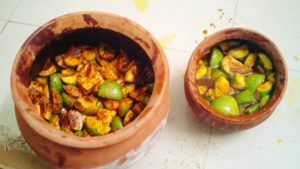 Thamma (Grandmother) was waiting for them in the open space in front of their house, lying in an armchair, protecting herself made pickles from birds, monkeys, some monkeys incarnated as children- all of them were eager to get a chance to get a hold of one of the jars.
Thamma (Grandmother) was waiting for them in the open space in front of their house, lying in an armchair, protecting herself made pickles from birds, monkeys, some monkeys incarnated as children- all of them were eager to get a chance to get a hold of one of the jars.
 Thamma was known in the village for her exceptional cooking skills. Rishabh did not inherit her skills but was always the best food taster that she could ever find anywhere. Every time Rishabh visits her, she makes new dishes every day, and serves it to him. If he approves, then she adds it to the yearly family feast. If he doesn’t then the dish is never made again. She was really very happy to see her grandson after a long time. Happy to see that her request was considered.
Thamma was known in the village for her exceptional cooking skills. Rishabh did not inherit her skills but was always the best food taster that she could ever find anywhere. Every time Rishabh visits her, she makes new dishes every day, and serves it to him. If he approves, then she adds it to the yearly family feast. If he doesn’t then the dish is never made again. She was really very happy to see her grandson after a long time. Happy to see that her request was considered.
– “What have you made for me today? They did not let me eat peacefully on the bus.” said Rishabh touching her feet.
Thamma visibly happy to see her grandson, kissed his cheek and showed him the washroom without any words.
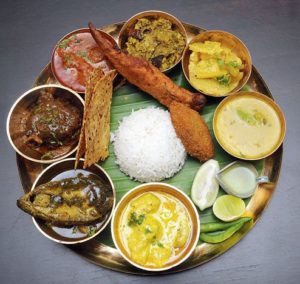 Finally, when he came after changing his clothes, he saw a brass plate full of rice, five types of fries in it. Beside the plate there were small brass bowls, containing dal, cooked with fish heads, simple Macher Jhol (Fish Curry) and Aamer Chutney (Sour-sweet dessert made with ripe Mangoes). This was just the hint that was going to come to Rishabh at night. As he had a long journey, Thamma kept the lunch menu as simple as possible.
Finally, when he came after changing his clothes, he saw a brass plate full of rice, five types of fries in it. Beside the plate there were small brass bowls, containing dal, cooked with fish heads, simple Macher Jhol (Fish Curry) and Aamer Chutney (Sour-sweet dessert made with ripe Mangoes). This was just the hint that was going to come to Rishabh at night. As he had a long journey, Thamma kept the lunch menu as simple as possible.
After he finished his lunch, Thamma showed him his room, where he took his afternoon nap. All evening, he spent time with his cousins who lived nearby. He was feeling really happy, watching all the traditions strictly being maintained by the village women. And finally came the time of dinner. In his village, they sleep early and they wake up early. He never saw Thamma all evening.
She must be busy making the dinner, I hope.
Thought Rishabh in his mind, and busied himself with something else. At eight o’clock, he was called to the dining area, where everyone else was waiting for him. As he entered, he saw plates and small bowls and saucers were placed in front of a low wooden slab, where you have to sit while eating. The view seemed really mesmerizing to Rishabh.

The steaming white rice kernels looked like fresh jasmine on the plate. Almost all the surrounding area of the wooden slab was covered with bowls of different shapes and sizes. Filled with Bengali dishes that one can think of at a time. But there was one plate that attracted Rishabh the most. A plate which had amazing designs on them. He didn’t understand if they were to eat or to be looked at.
– “Sit down Dadubhai (Grandson), there is a lot to finish.” said Thamma in a stern voice.
– “All this for just one person, it’s not fair, I tell you Thamma. How can I finish all of this at once? Even if I do, I will not be hungry for at least two days.”
– “Then you should visit here more often. I was not sure when you will come again, so I prepared what I could.”
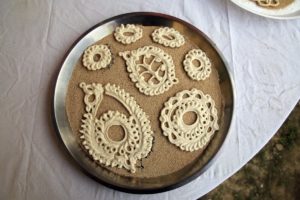
“She really is incredible!” thought a happy Rishabh. But could not help asking – “What are these designer things Thamma? Is it a new decoration?”
– “Yes! A decoration you can eat.”
– “Eat? They are edible?”
– “Of Course, they are. We call it Gohona Bori (dried lentil dumpling popular in Bengali cuisine).”
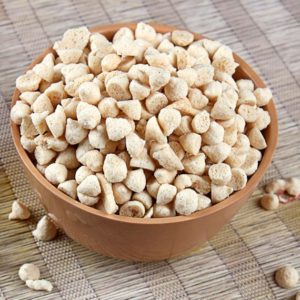
Bori, is a renowned name for a Bengali child. We all grow up eating bori. We put it in the preparations of banana flowers, bottle gourd et cetera. Bori itself can be a separate dish when prepared with potatoes. Not all of us like it though. It comes in so many different shapes and sizes. The big circular droplet like ones are used for the curry with potatoes. The medium ones are used to accompany other vegetables, and the small cute drops of heaven are normally eaten fried, with lentils. The preparation of bori is something worth watching. But this name Gohona Bori, Rishab was hearing for the first time. While he was eating, Thamma was informing him about the origin of Gohona Bori.
Though rarely found nowadays, Gohona Bori or Gohona Bori for the colloquial, is an age-old delicacy, changing itself through the ages. It is still found in East Midnapur of West Bengal. Before the British rule in India, they did not use poppy seeds in it, but homemade spices. After the discovery of the illegal opium market in China, Britishers, the ruthless businessmen, forced the farmers of the Rarh region of Bengal, to produce opium. The seeds of opium, which is poppy, were dropped after extracting opium from them. These dropped seeds, Posto (Poppy Seeds), as Bengalis call them, became a delicacy to the people. They started using it in Gohona Bori too.
 As we know, bori actually is sun dried black gram droplets which we fry and use. Though we Bengalis have a knack for variations and so we did not stop at only black gram. There is lentil and pulses too that we use in our bori. Each and every one of them tastes different from the other with the use of spices and the permutation combination.
As we know, bori actually is sun dried black gram droplets which we fry and use. Though we Bengalis have a knack for variations and so we did not stop at only black gram. There is lentil and pulses too that we use in our bori. Each and every one of them tastes different from the other with the use of spices and the permutation combination.
Gohona Bori typically is made of black gram and homemade spices and are designed upon a plate sprinkled with poppy seeds. There may be two reasons for that. First it is easier for the bori to come out of the plate if it is sprinkled with poppy seeds, as it is delicate to handle and can break easily. Second, poppy seeds add some extra crunch and earthy taste to the bori, but the first reason is the most important one because bori itself is crunchy after you fry it. Some people add sesame instead of poppy seeds. Usage is the same. But using sesame comes with a responsibility of giving it a sun bath every two or three days. Else it will smell awful.
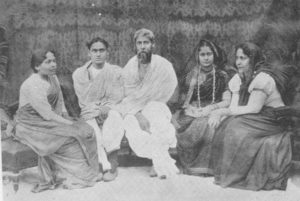 The famous Tagore family was also awestruck by its beauty. Rabindranath Tagore, having seen some, presented by his student at Santiniketan, preserved their photos in the catalogs, which can be seen in the museum, while Abanindranath Tagore’s heart cried that a work of art has to be destroyed as it is edible.
The famous Tagore family was also awestruck by its beauty. Rabindranath Tagore, having seen some, presented by his student at Santiniketan, preserved their photos in the catalogs, which can be seen in the museum, while Abanindranath Tagore’s heart cried that a work of art has to be destroyed as it is edible.
It is the epitome of the ecstasy of simplicity. A proof that serving has real importance when you are feeding someone. And if a normal bori is served with elegance this much, your heart fills itself with wholesomeness.
As Thamma was describing it to Rishabh he busied himself with the food he was served with. Listening to her stories, he took a bite of the Gohona Bori, which took him to another level of deliciousness. After every visit to his village, Rishabh finds another reason to respect his land, his heritage. The rest of the trip had to be awesome, there was no doubt about it. Finally, the day came when he had to bid goodbye to his loving relatives and especially Thamma.
 After having lots of Thamma’s delicious dishes, mostly made out of the fishes and vegetables, given to her in Rishabh’s honour, finally Rishabh got inside the bus to his home. His weight has increased to some kilos, he was not sure, it was his body that got heavy or his heart. From the window of the bus, he looked at Nakul da, and the bus started. He looked the way, as long as he could, and watched Nakul da fade away.
After having lots of Thamma’s delicious dishes, mostly made out of the fishes and vegetables, given to her in Rishabh’s honour, finally Rishabh got inside the bus to his home. His weight has increased to some kilos, he was not sure, it was his body that got heavy or his heart. From the window of the bus, he looked at Nakul da, and the bus started. He looked the way, as long as he could, and watched Nakul da fade away.
– “Will you turn off your laptop now? It’s midnight!” his mother said.
– “I know ma (Mother)! Why are you awake? Go to sleep.”
Rishabh turned off his laptop, thinking about his village, their food and life. Then, slowly got engulfed into a deep slumber.


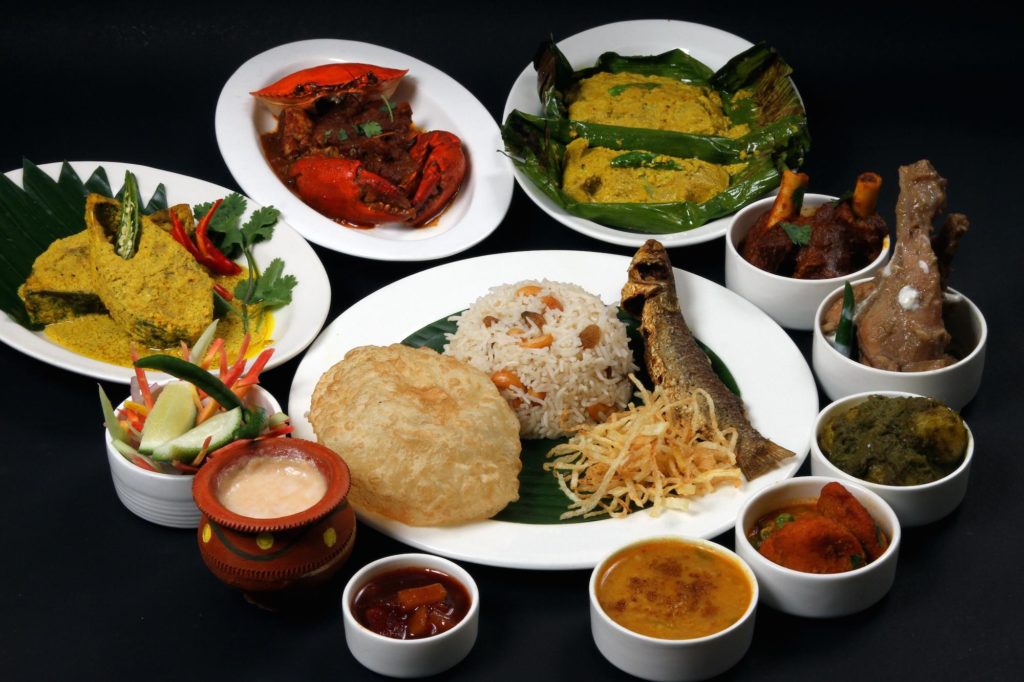
Jhilik, you really once again titillated the test buds of this old foodie. However, I wish this nice piece were written in Bengali. That would have added extra flavour to this narration.